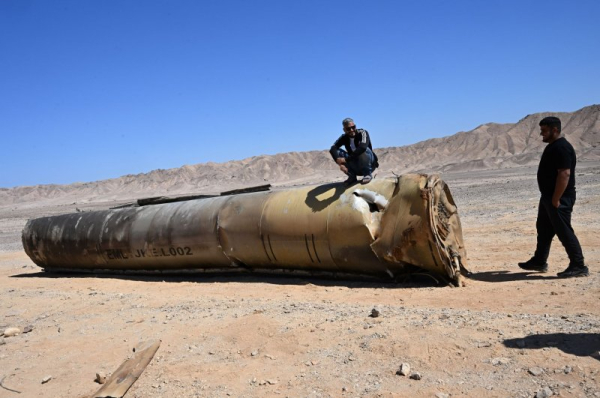Immaculate war is a dangerous notion

People look at the wreckage of an Iranian ballistic missile in the Negev Desert near Arad, Israel, on Oct. 3. File Photo by Debbie Hill/UPI | License Photo
One of the most dangerous misconceptions in war is that conflict can be immaculate — namely, fought with little or no bloodshed. Technology has promoted this myth on the grounds that the more precise weapons become, the more efficiently wars can be fought and collateral damage minimized. Operation Desert Storm in 1991, the 100-hour campaign to eject then-president of Iraq Saddam Hussein from neighboring Kuwait, was the poster child for immaculate warfare.
In overwhelming one of the largest armies in the world, the United States lost 147 service personnel killed in action. As General Colin Powell, then-Chairman of the Joint Chiefs of Staff, outlined in his plan, the goal was to cut off the Iraqi army and “kill it.” The coalition did — to some, immaculately. Advertisement
But as recent conflicts in Ukraine and in Gaza have shown, war is not immaculate. Since invading Ukraine in 2022, Russia may have suffered up to half a million casualties, with a fifth or more of its soldiers killed. Ukraine has not released its casualty lists. But the deaths are substantial. Advertisement
In Gaza, about 40,000 Palestinians have been killed since the Oct. 7, 2023, Hamas-led attack on Israel. The Israeli incursion into Lebanon in its war against Hezbollah has already claimed several thousand lives. And the Israeli Defense Force (IDF), likewise, is not invulnerable.
After Iran’s Oct. 1 ballistic missile attack against Israel, in which 181 missiles claimed only one life — a Palestinian — Israel is contemplating its retaliatory options. There are three basic targets: Iran’s oil production and distribution facilities; its military forces, logistical and production capabilities; and its nuclear infrastructure. President Joe Biden has urged Israeli Prime Minister Benyamin Netanyahu to not attack Iran’s nuclear facilities on the grounds that such a strike would be excessively destabilizing.
Proponents of launching such an attack argue that Iran can never be allowed to develop a nuclear weapon and the attack may be the last opportunity to prevent Tehran from achieving that capability. These proponents understand these facilities are vast, spread out across the country, deeply buried and protected, and may not be susceptible to complete destruction. But by eliminating or reducing a majority of the centrifuges necessary for uranium enrichment, the time to field a weapon would be deferred, possibly indefinitely. Advertisement
This argument reflects the immaculate war thesis, namely, that select targeting will be sufficient to terminate Iran’s nuclear aspirations. Here is a reality: Eliminating all of Iran’s nuclear weapons potential can only be assured by physical occupation or inspection of Iran’s facilities following an attack to ensure their complete destruction, not only of infrastructure and delivery systems, but seizure of all nuclear materials as well.
In that context, three basic questions must be addressed before making any decision to attack Iran:
First, is it possible to disarm Iran of all its nuclear weapons and delivery capabilities without using nuclear weapons or ground forces, given the extent of these facilities and the degree to which they have been hardened? Too often the difficulty of this mission is underestimated, as former Central Command Commander Marine General Frank McKenzie has made clear.
Second, if the mission fails, will it force Iran to go nuclear? Iran’s leaders have repeatedly called nuclear weapons haram, or immoral and against the will of Allah. Would such an attack call into question Iran’s sovereignty and thus cause its leaders to conclude nuclear weapons were essential to security?
Third, would an attack precipitate a nuclear disaster such as Chernobyl? A nuclear reactor could be mistakenly targeted. Or fissile material could be released. These uncertainties would surely need to be considered. Advertisement
Israel almost certainly lacks the ability for a completely effective conventional disarming strike, due to the needed numbers of attacking aircraft and missiles and refueling for the air assets. Will this lead to the use of nuclear weapons, and would it be effective? And with only boots on the ground, could complete damage assessment be completed?
The United States views Iran’s acquisition of nuclear weapons as a potentially existential crisis. But what about North Korea? Is Kim Jong Un more or less stable than Iran’s supreme leader? Would Iran achieving nuclear weapons be as catastrophic as the United States assumes? Or would some form of nuclear deterrence with Israel still apply?
On one hand, Iran’s acquisition of nuclear weapons would be enormously destabilizing. On the other, given the difficulties and uncertainties of the effectiveness of any attack, nuclear or conventional, any decision must be carefully weighed. And in this decision-making process, do not allow notions of immaculate war to influence the options or choices.
Harlan Ullman is UPI’s Arnaud de Borchgrave Distinguished Columnist, a senior advisor at Washington’s Atlantic Council, the prime author of “shock and awe” and author of “The Fifth Horseman and the New MAD: How Massive Attacks of Disruption Became the Looming Existential Danger to a Divided Nation and the World at Large.” Follow him @harlankullman. The views and opinions expressed in this commentary are solely those of the author. Advertisement